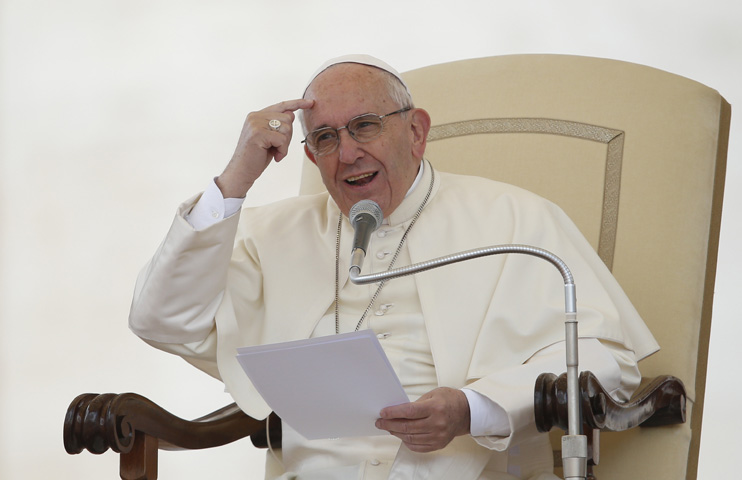
Pope Francis speaks as he leads his general audience in St. Peter's Square at the Vatican April 27. (CNS/Paul Haring)
In the face of the suffering of so many people around the world, Christians "cannot remain spectators" but must get involved and help, Pope Francis urged in his weekly general audience Wednesday.
"Ignoring a person's suffering, what does it mean?" the pontiff asked the crowds in St. Peter's Square present for the event.
"It means ignoring God!" the pope exclaimed. "If I do not get close to that man, that woman, that child, that old person who is suffering, I am not close to God."
Francis was reflecting Wednesday on the Gospel parable of the Good Samaritan, when Jesus speaks of three people who encounter a man on the side of the road who has been beaten and robbed. Two of the men -- a priest and a Levite -- pass the man by, but the Samaritan takes him to an inn and provides care for him.
Jesus gives the parable in response to a question from a lawyer, who says he is following the commandment to love God and neighbor but asks: "Who is my neighbor?"
Francis said the man "wants a clear rule that permits him to classify others as 'neighbor' and 'not neighbor,' who can become a neighbor and who cannot become a neighbor."
The parable, the pope says, gives a different response. He said it "teaches us that compassion, love is not a vague sentiment but means taking care of the other even at a personal cost."
"It means compromising yourself, carrying out all the steps necessary to get close to the other," said Francis.
The pope said the first two people to encounter the beaten man "were in a hurry."
"Maybe the priest looked at his watch and said, 'But I will arrive late for Mass; I have to say Mass,'" imagined the pontiff. "And the other said, 'I do not know if the law permits it because there is blood there and I will be impure.'"
"This parable offers us a first teaching," said Francis. "It is not automatic that whoever frequents the house of God and knows God's mercy will know to love their neighbor."
"It is not automatic!" he exhorted. "You can know the whole Bible, you can know all the liturgical rubrics, you can know all of theology, but from that knowledge love is not automatic. Love has another way."
"The priest and the Levite see, but ignore; look, but do not help," said the pope. "Yet, true worship does not exist if it does not translate into service of neighbor. We can never forget it: in front of the suffering of so many people exhausted from hunger, violence and injustice we cannot remain spectators."
Francis then mentioned how the Gospel account of the parable says the Samaritan was "moved with compassion" at the sight of the beaten man.
"Here is the difference," said the pontiff. "The other two 'saw,' but their hearts remained closed, cold. But the heart of the Samaritan was attuned to God's heart."
"In fact, compassion is an essential characteristic of the mercy of God," said the pope. "God has compassion for us. What does it mean? God suffers with us; God feels our sufferings."
"The verb indicates God's innards move and tremble in sight of people's pain," said Francis. "And in the gestures and actions of the Good Samaritan we recognize the merciful action of God in the whole story of salvation."
"It is the same compassion with which the Lord comes to meet each of us," said the pontiff. "He does not ignore us, he knows our pains, knows how much need we have for help and consolation. He comes close to us and never abandons us."
"Each of one us must look in our heart if we have faith in this compassion of God, of good God who gets close, heals us, caresses us," the pope urged. "And if we refuse it, God waits: God is patient and is always next to us."
"This parable is a wonderful gift for all of us, and also a commitment," said Francis. "To each one of us, Jesus repeats what he said to the doctor of the law: 'Go and do likewise.'"
"We are called to take the same path as the Good Samaritan, who is a figure of Christ," said the pope. "Jesus bent down over all of us, was made our servant, and so saved us -- so that we also can love as he loved, in the same way."
[Joshua J. McElwee is NCR Vatican correspondent. His email address is jmcelwee@ncronline.org. Follow him on Twitter: @joshjmac.]

